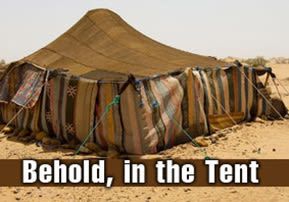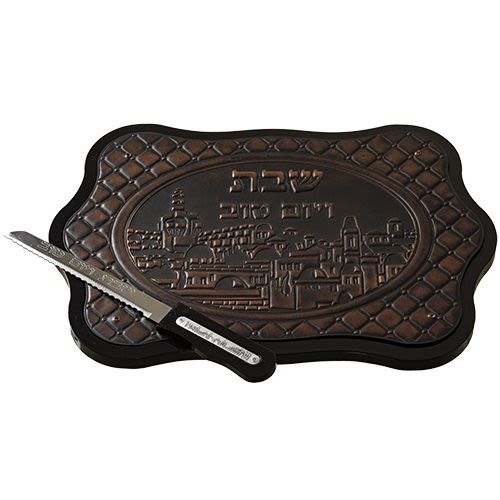
Vayera: Behold, in the Tent
The ministering angels' question was rhetorical, since they knew where Sarah was. They intended to call attention to her modesty and endear her to her husband…

Parshat Vayera
WHY DID THE ANGELS ASK FOR SARAH?
“They said to him `where is Sarah your wife?’ he answered, `behold in the tent’” (Bereishit 18:9). Sforno explains that the angels asked for Sarah since G-d had already imparted to Avraham the good tidings of Sarah's forthcoming pregnancy and birth. Therefore, the mission of the angels was especially to tell Sarah the good news. The happiness of her anticipation would enhance the development of her fetus. This teaches us that the inherent connection between the emotions of the mother and her unborn child, which science only recently began to discover, was all along revealed to our Sages. According to Be’er Mayim Chayim, the angels asked for Sarah, because of the importance of the wife's participation in hachnasat orchim, (welcoming guests). The presence of the woman makes the guests feel welcome when her gestures indicate that she is pleased with their visit. Since the angels were aware of Sarah’s righteousness they were sure that she would want to participate in welcoming them. They were, therefore, surprised when she was nowhere to be seen.

BEHOLD IN THE TENT
Avraham answered that despite the importance of welcoming guests, “the honor of a king's daughter is within” (Tehillim 45:14). This is why Sarah, out of modesty, remained in the tent. According to Rashi the ministering angels' question was rhetorical, since they knew where Sarah was. They intended to call attention to her modesty and thus endear her to her husband. Rashi adds a second explanation: that the angels asked for Sarah in order to send her the wine cup of blessing. Sarah had to partake of this cup, since it brings blessings down from above and permeates the household with holiness. Until this day, it is a mitzvah for the husband to ensure that the kos bracha (wine cup of blessing held during grace after meal) is sent to his wife.
WHERE IS HER SPIRITUAL PLACE?
Kli Yakar remarks that Avraham was already well aware of Sarah's modesty and did not need the angels to remind him. They actually did not ask for Sarah's physical location; rather their question was directed at her spiritual abode. They wanted to prevent Avraham from thinking it was Sarah's fault that they didn't have children, since the reward for modesty is to bear kings as we learn from Tamar (Megillah 10b). The question “where is Sarah?” thus meant: “At what level are her deeds that she should be worthy of a son?” The answer given is “in the tent.” The level of her modesty makes her worthy of giving birth to holy offspring. The mitzvah of welcoming guests also imparts the merit of bearing children. When we act with love for others by giving to guests, it follows that we are ready to behave lovingly to the guests of our womb. However, what is the connection between modesty and conceiving princely children? Perhaps we can explain thatbeing modest shows that we are ready to diminish our own selfhood in order to make room for someone other than ourselves. Humble parents will understand that their children are not their own possessions but rather images of G-d in their own right. This enables them to conceive extraordinarily high neshamot (souls), worthy of royalty.
PEACE IS GREATER THAN TRUTH
“Therefore Sarah laughed within herself, saying, ‘After I am faded shall I have pleasure, my lord being old also’? And Hashem said to Avraham, why did Sarah laugh, saying, shall I really bear, I being old?” (Bereishit 18:12-13) Rashi points out that G-d changed Sarah's words when addressing Avraham. Rather than quote Sarah's words – “…and my lord being old…” Scripture changes her words to maintain peace between them. From here we learn that one is permitted to change the truth for the sake of preserving peace between people. Rabbi S. R. Hirsch expresses a romantic outlook on marriage. He explains that no matter how old the husband may be, it is preferable that he doesn't know that his wife considers him old. To each other, husband and wife must forever remain youthful.
WHY DID SARAH LAUGH?
Ohr HaChayim notices that Avraham also laughed when Hashem promised him that he would have a son with Sarah (ibid. 17:17). What is the difference between Avraham’s and Sarah's laughter? Onkelos translates Avraham's laughter as “chadei” – to rejoice – and Sarah's laughter “chayechet” – to mock. How can the same word be translated into two completely different meanings? Mattis Weinberg explains that Avraham spoke in a general language saying: “…Shall a child be born to him that is a hundred years old?” whereas Sarah placed herself in the center: “…after I was faded, I had pleasure?” Avraham spoke in the future tense indicating that the future might deviate from the usual way of the past. However, Sarah spoke in the past tense emphasizing that what was will continue to be, disbelieving the thought that the nature of her body would be altered. Nonetheless, Kli Yakar ascribes it to her praise that she only laughed within herself, never daring to bring this laughter to her lips. Sarah was only reproved for the little laughter in her thoughts. This only emphasizes her holy level; the sin Sarah had to refine was so subtle, so small.
WHY DID SARAH DENY?
“Then Sarah denied, saying, ‘I laughed not; for she feared.’ ‘And he said, no, you did laugh’” (ibid. 18:15). Ohr HaChayim comments on the words: “for she feared,” explaining that the heart of the faithful servant will be filled with fear even over an accidental transgression. Nevertheless, all the commentaries are astonished that the righteous Sarah would deny the words of G-d. According to Sfat Emet, Sarah had already repaired the sin of her laughter, erasing it by means of her immediate repentance. However, only repentance out of love and not out of fear transforms the transgression into merit. At first, Sarah had only repented out of fear, as it states, “for she feared.” Therefore, Avraham reprimanded her saying, “but you did laugh,” meaning that a different quality of repentance was still necessary in order to transform the blemish of having laughed to the extent that it could become a merit. The indication that Sarah succeeded in reaching this level of repentance is expressed in the name of Yitzchak, which means “he will laugh.” When Sarah gave him this name, she happily exclaimed, “G-d has made laughter for me” (ibid. 21:6). By returning to Hashem in perfect love, she was able to transform and raise up the quality of her laughter to become a source of blessing for all.
(Rebbetzin Chana Bracha Siegelbaum is Director of Midreshet B’erot Bat Ayin in Gush Etzion. This article is an excerpt from her book Women at the Crossroads: A Woman’s Perspective on the Weekly Torah Portion, reviewed by The Jerusalem Post, The Jewish Press, Voices Magazine, Good Reads, and WordPress/JewishPress and more. To order this book, click here)











